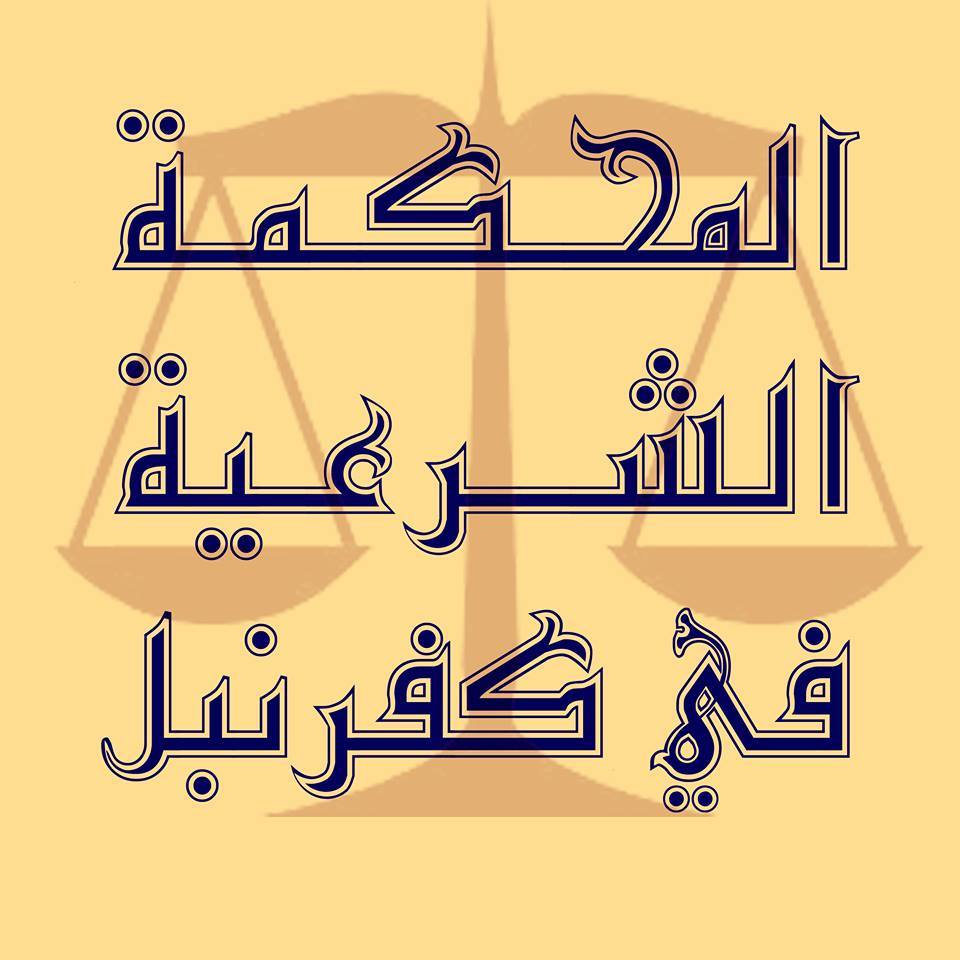In Idlib, Some Turn to Sharia Courts

Umm Mohammad is waiting anxiously to hear whether a Sharia court in the rebel-held town of Kafr Nabel will reverse a decision made by a Damascus court more than four decades ago.
She says that 42 years ago, corrupt judges transferred ownership of a plot of land she had bought from the town council to someone who had bribed them.

“I heard that judges in the Sharia court were honest, so I decided to take my case there,” said Umm Mohammad, 82. “I hope it is able to swiftly restore my legal right to my stolen land.”
“I don’t want the current judiciary to have the same reputation as it did under the regime. The corrupt judiciary was one of the main reasons people rebelled against the regime,” she continued. “I don’t need to pay bribes, and I can’t bring myself to buy a judge’s favour.”
The Sharia court in Kafr Nabel was set up at the end of 2012 after the town was liberated and old judicial system was dismantled.
The head of the Sharia court, Ayman al-Bayyush, says the justice process is much better now than in the old days when bribery and perjury were rife.
“Those who follow the changes going on in liberated areas have observed a vast difference between the state of the judiciary before the revolution and four years later. The difference is clear on every level, from the time it takes to reach a decision to changing injustices into justice,” he said. “The judiciary just might be the first sector that has been reformed, despite the continued weakness of enforcement.”
Established by a numbers of Islamic clerics and lawyers, the Idlib court became part of the Islamic Organisation for the Management of Liberated Areas in summer 2014. The court employs 65 people, including judges, ancillary staff and security officers. Its head is elected every six months.
After the court joined the Islamic Organisation, its judges were sent on training courses run by the Syrian Higher Judicial Institute. Based in the Turkish city of Sanliurfa, the institute was founded in August 2013 by two of Syria’s most prominent legal authorities who defected from state judiciary, along with the League of Syrian Ulama.
“These workshops are conducted over a period of two months and train 50 people at a time. The trainers use the Institute for Unified Arab Law as their reference point since it bases its provisions on Sharia law,” Bayyush said.
The Sharia court differs from state civil courts in its rejection of man-made law. It also differs from the courts operated by Salafist fundamentalists in that its judges are qualified jurists.
It coordinates with Dar al-Qada, the network of courts run by the Jabhat al-Nusra groups. According to Bayyush, this is because “the court relies on the security forces and police to enforce its decisions, but these forces are weaker than those of Dar Al-Qada, which controls a large military force and ensures compliance by punishing those who do not obey it.”
The Idlib court handles all manner of cases, from marital disputes to murder. It does not look at cases that have already been closed, except for those that are clearly tainted by corruption or forgery.
“We have stopped imposing Sharia punishments for felonies such as theft, blasphemy, or insulting God, the prophet, or religion,” Bayyoush said. “This is because of the absence of a Muslim caliph and other conditions that are necessary in order to issue such decisions. For lesser crimes, the judges rely on prison sentences, fines and the like. Murder is the only exception, as the penalty is either based on Sharia law or involves financial compensation for the victim’s family.”
According to Judge Mustafa al-Rahhal, “The court takes on all kinds of civil, criminal and religious cases. It bases all its decisions on Sharia law regardless of the type of case it is adjudicating on.”
Judge Rahhal noted that the court could also refer cases to other courts with specific jurisdictions, and that its decisions could be appealed at the higher-level central court of the Islamic Organisation.
As evidence that the court is even-handed, Judge Rahhal cited a recent murder trial where the accused was a judge.
According to the court’s treasurer Khaled al-Khatib, employees earn 100 US dollars a month at most.
Some residents of Kafr Nabel see the court as a genuine alternative to
the old system.
Ahmad al-Said, 22, got married in the Sharia court because he wanted
to avoid supporting the state system.
“I was worried that the court fees I would have to pay would end up in the regime’s coffers and buy bullets to kill innocent people,” he said.
